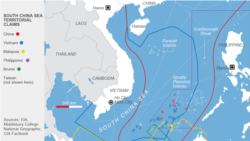The United States imposed sanctions Wednesday on 24 Chinese companies and several people who allegedly participated in building and militarizing disputed artificial islands in the South China Sea.
The U.S. Commerce Department said in a statement the companies played a “role in helping the Chinese military” with the construction project, while U.S. Secretary of State Mike Pompeo said in a separate announcement that it was placing visa restrictions on individuals “responsible” or “complicit” in the project.
“Since 2013, the PRC [People’s Republic of China] has used its state-owned enterprises to dredge and reclaim more than 3,000 acres on disputed features in the South China Sea, destabilizing the region, trampling on the sovereign rights of its neighbors, and causing untold environmental devastation,” Pompeo said.
The U.S. action on Wednesday follows a policy update in July that explicitly called out Beijing’s “unlawful maritime claims” in the South China Sea.
The actions are the latest steps the U.S. has taken against China for its military buildup on territory in the South China Sea, where sovereignty is claimed by several countries.
“In doing this, we have various aims, including of course to impose costs on bad actors and to encourage all sorts of parties and institutions and governments around the world to assess risk and reconsider business deals with the sort of predatory Chinese state-owned enterprises that we've identified here,” a senior U.S. State Department official told reporters during a Wednesday telephone briefing.
The U.S. accused China in June of trying to build a “maritime empire” in the South China Sea, which was denied by Beijing.
“We always treat our South China Sea neighbors as equals and exercise maximum restraint,” Chinese Foreign Ministry Spokesperson Zhao Lijian told reporters in July.
China did not immediately respond to the sanctions. China claims at least 80% of the South China Sea, which has vast oil and gas reserves. Brunei, Malaysia, the Philippines, Taiwan and Vietnam also claim jurisdiction to parts of the area through which trade valued at $3 trillion passes annually.
Among the sanctioned state-owned companies are construction giant China Communications Construction Co., a subsidiary of the China Shipbuilding Group, and a telecommunications company.
The 24 Chinese companies added to the U.S. “entity list” will be banned from purchasing technology and other products shipped from the U.S. While other firms can request a license to continue selling to Chinese companies on the U.S. entity list, such requests are often denied.
“The party seeking to make that transfer of commodities, equipment, software, or technology to the parties on the entity list has to come into Commerce for a specific license,” Deputy Assistant Secretary of Commerce for Export Administration Matthew Borman told reporters in a Wednesday briefing.
“The licensing policy is presumption of denial for any such proposed exports, re-exports, or in-country transfers,” he added.
As the U.S. is explicitly endorsing the substance of a binding ruling by a Permanent Court of Arbitration in The Hague four years ago, China dismissed the ruling. The binding decision issued July 12, 2016, rejected China’s maritime claims as having no basis in international law.
“The Arbitral Tribunal violated the principle of state consent and exercised its jurisdiction ultra vires. There are obvious errors in fact finding and law application in the Award,” said Zhao, the foreign ministry spokesperson, during a press conference July 14.
Wayne Lee contributed to this report.






